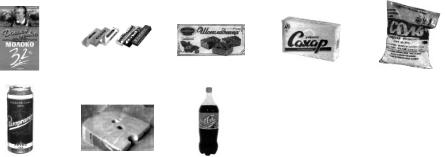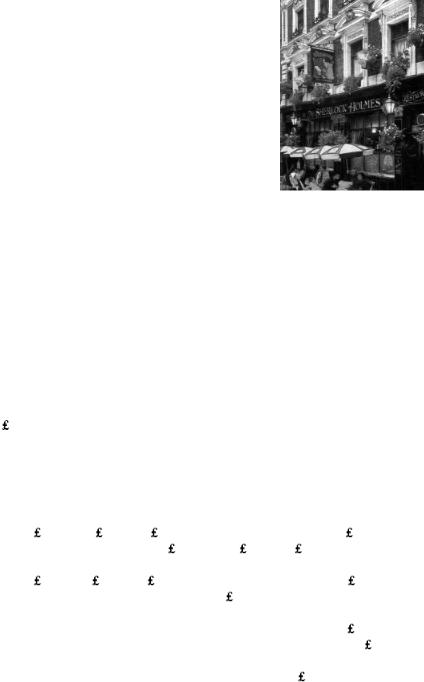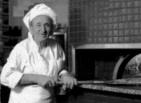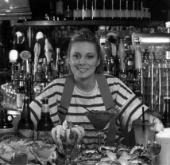
bogatyreva_m_a_uchebnik_angliiskogo_yazyka_dlya_neyazykovyh
.pdf
“I'd like (would like) to do sth”
употребляется для выражения предпочтений:
“Would you like some tea now?” (Do you want some tea?)
“Yes, I would. / No, thank you.” Сравните данный оборот с глаголом “to like” – нравиться: “Do you like tea?” (Do you think tea is nice?) “Yes, I do.”
Covent Garden
Cultural Note
Covent [ kPvqnt] Garden is an area of London once (когда'то) famous for its fruit and vegetable market. Now there are expensive but popular shops and eating places there.
4а. Ответьте на предложение вашего коллеги таким образом.
Example: |
Would you like to go out for dinner? |
|
|
Yes, I would. Yes, I’d love to. |
|
go to the Odeon |
have a party |
visit some friend |
practise sports |
go to the theatre |
walk in Covent Garden |
5.Listening.
а) Listen and practise this dialogue.
Remember!
an* ice'cream [ aIsk ri:m] – мороженое fruit [fru:t] – фрукты
a piece [pi:s] – кусок
* Здесь неопределённый артикль перед неисчисляемым существительным означает одну порцию. Сравните: a beer, two omelet(te)s, four salads.
Note! |
on a diet – на диете |
140
A.Please, come in.
B.Thank you.
A.Please, sit down. Would you like a cup of tea?
B.Yes, please.
A.How about a piece of cake?
B.No, thanks. I’m on a diet.
b) Roleplay similar conversations with the following words.
a banana |
a biscuit [ bIskIt] |
an apple |
a sandwich [ s n w i ] |
a fruit salad |
an ice'cream |
6. Посмотрите в свою записную книжку и обсудите с коллегой, куда можно сходить после работы. Используйте идеи
из колонки справа. |
|
|
|
Mon: go shopping |
|||
|
|||
|
Tue: come to my house |
||
Remember! |
Wed: |
play cards |
|
Thur: take photos |
|||
to take a photo – сделать снимок |
Fri: |
visit a museum |
|
instead [In sted] – вместо этого |
Sat: |
go to a cafe´ |
|
|
Sun: |
see a new film |
|
Example:
Would you like to eat at McDonalds on Monday? Why don’t we see a new film instead?
That’s a good idea.
7.Listening.
a) Listen and answer.
When is the party?
Is the girl busy on that day?
Remember! a party [pa:tI] – вечеринка
|
really [ rIqlI] – действительно |
|
thanks anyway [ enI, weI] – в любом случае, спасибо |
Note! |
What a pity! – Какая жалость! |
|
perhaps [ q hxps] – может быть |
141
A.Would you like to come to a party?
B.Well, I’d like to…but when is it?
A.On Saturday evening.
B.What a pity. I’m busy on Saturday.
A.What are you doing?
B.I’m working on the computer.
A.Really? Another time perhaps?
B.Yes, thanks anyway.
b)Listen once again and practise this dialogue.
c)Roleplay similar conversations with the following words:
a picnic |
a football match |
a cocktail party |
|
|
|
|
a lecture |
a pop concert |
a pub |
|
|
|
|
Set 2 |
Food, Drink and Money |
|
|
|||
|
Продукты питания и деньги |
|||||
8. Спросите у собеседника, сколько |
|
|
|
|||
|
|
How much food? |
||||
у него в холодильнике продуктов. |
|
|
||||
|
|
(+) |
||||
|
|
|
|
|
|
much, |
Example: |
|
|
|
|
a lot of много |
|
A. Have you got much milk in your fridge?* |
|
|
(±) |
|||
|
|
a little немного |
||||
|
|
|
|
|
|
|
* Fridge (frig) – сокращённая форма от слова “refrigerator”. |
|
(–) |
||||
B. Yes, a lot. |
|
|
|
|
|
little мало |
|
|
|
|
|
|
|
|
|
|
|
|
|
|
C. Just a little. |
|
|
|
|
|
|
D. No, not much.** |
|
|
Неисчисляемые |
|||
|
|
существительные |
||||
E. There’s (very) little. |
|
|
|
|
milk |
|
|
|
|
|
|
|
sugar |
** Наречие “much” чаще всего встречается |
|
|
|
chocolate |
||
в вопросительных и отрицательных предложениях, |
|
|
|
orange juice |
||
в то время как “a lot” – в утвердительных: They haven’t |
|
|
|
|||
got much money, but they ‘ve got a lot of friends. |
|
|
yogurt [`jPgqt] |
|||
|
|
|
|
|
|
|
9. Подберите из списка слова, соответствующие рисункам.
142

Milk, chewing gum, chocolate, sugar, salt, beer, сheese, cola.
a) Переведите данные словосочетания на русский язык.
A SHOPPING LIST
Исчисляемые |
|
Неисчисляемые |
существительные |
|
существительные |
a carton |
|
milk |
a packet |
of |
chewing gum |
a can |
|
beer |
a piece |
|
cheese |
a kilo |
|
sugar / salt |
a bottle |
|
cola |
a bar |
|
chocolate |
b) Buy some products from your shopping list. Work with a part-
ner.
What do you want to buy?
Remember! |
to buy [baI] – покупать |
Example:
Would you like some* mineral water? Yes, please. I’d like a bottle of water.
* В вопросах, выражающих вежливую форму, употребляется неопределенное местоимение “some”.
143

10. You’re in the Sherlock Holmes Pub in Baker Street.
Cultural Note
Pubs are part of British life. Even very small villages (деревни) have a pub. People, mostly men, go to the pub for a drink in the evening and at weekends. Pubs often sell (продавать) food and drinks. Pubs have names: “The Angel”, “The Black Swan”, “The Crown”, “The King’s Arms”, “The Red Lion”.
Remember!
a roll [rqVl] – булочка ham [hxm] – ветчина chicken [ tSIkIn] – курица
crisps [krIsps] – хрустящий картофель
a pot [pPt] – чайник с заваренным чаем (кофе)
a) Find some of the food on the menu and ask your partner about the price.
Example:
How much is a chicken sandwich and a small cola? 3.40.**
**  3.40 = three pounds forty;
3.40 = three pounds forty;  1 (one pound) = 100p (a hundred pence)
1 (one pound) = 100p (a hundred pence)
M e n u
FOOD |
|
|
|
|
DRINKS |
|
|
|
Sandwich Roll |
Salad |
|
|
|
||
Ham…..... |
2.10 |
2.00 |
3.15 |
Tea…….…… |
1.40 a pot |
||
Cheese..... |
|
|
|
2.25 |
2.05 |
3.40 |
|
|
|
65p a cup |
|
|
|
||
Chicken..... |
2.50 |
2.30 |
3.50 |
Coffee……… |
1.70 a pot |
||
Soup |
o |
f t h |
e |
day……... |
2.15 |
|
|
|
|
|
|
80p a cup |
|
|
|
Biscuits……… |
95p a packet |
|
|
Hot chocolate…..…. |
1 30 |
||
Cakes…… 80p each chocolate/lemon/fruit |
Orange juice…….. |
1.50 a |
|||||
glass |
|
|
|
|
|
|
|
Yogurt……… |
85p natural / fruit |
|
Cola………… |
1.20 a large glass |
|||
Crisps……… |
75p a packet |
|
|
|
90p a small glass |
||
|
|
|
|
|
Mineral water………75p a bottle |
||
144

b) Study the menu. Ask your partner
– about the dish of the day; |
– what he’d like to order / to eat. |
с) Read and practise this short dialogue.
Remember!
a dish [d iʃ] – еда, блюдо, кушанье
for the first / second course [k ɔ :s] – на первое / на второе for dessert [d i zE:t] – на десерт
A.What would you like for your first course?
B.I’d like some salad.
A.What sort of salad would you like?
B.What is there?
A.There’s green salad and tomato salad.
B.I’d like tomato salad, please.
d)Ask in the same way about sandwiches / drinks / desserts.
e)Roleplay.
You’re at table in a restaurant. Today is your friend’s birthday. Look at the menu above and ask him what he/she’d like to order. Use the following words.
Cheers! – За здоровье! (тост)
Happy birthday! – С днём рождения!
11.Listening "What do they call it?"
a) Listen to the dialogue and answer.
What are these people’s nationalities?
Why do you think so?
Remember! |
medicine [ m ed sin] – лекарство |
Cultural Note!
High Street is an important shopping and business street of a town in Great Britain. For example:
145
There are several banks in the high street.
b) Listen to the conversation a second time and write the British for these words. Explain their meaning.
AmE |
BrE |
a bill |
__________________________ |
pants |
__________________________ |
potato |
__________________________ |
ships |
__________________________ |
a parking lot |
__________________________ |
a drugstore |
__________________________ |
fried potatoes |
__________________________ |
main street |
__________________________ |
c) What sorts of fried potatoes are on sale in Great Britain?
12. Game “How Healthy Are You”?
Note! health – здоровье healthy – здоровый
at least – по крайней мере on foot – пешком
rarely – редко
Задание 1. Подчеркните a, b или c.
How do you usually get to work? |
a – by car |
|
b – on foot |
|
c – by bus, tube or train |
Do you smoke? |
a – every day |
|
b – sometimes |
|
c – rarely |
How often do you practise sports? |
a – often |
|
b – sometimes |
|
c – rarely |
How much tea and coffee do you |
|
drink? |
a – not at all |
|
b – less than* |
|
five cups a day |
146

How often do you exercise?
Do you eat fresh fruit and salads?
How many hours do you sleep every night?
How often do you eat cakes?
When do you normally go to bed?
* less than – менее, чем
c – at least five cups a day
a – every day b – sometimes c – never
a – every day b – sometimes c – rarely
a – at least seven or eight b – five or six
c – four or less a – very often b – sometimes c – very rarely
a – at 10.30 p.m. b – at midnight
c – after midnight
Задание 2.
Подсчитайте свои очки. За каждую букву “a” даётся 3 очка, за букву “b” – 2 очка и за букву “c” – 1 очко.
1.More than* 25 marks: You’re a health fanatic. You may live to be 100.
2.20'25 marks: You’re in good form.
You get the most out of life.**
3.15'20 marks: Not bad, but why don’t you buy a pair of shorts instead of eating that cake?
4.Less than 15 marks: Oh, dear!***
Eat to live but not live to eat!
*more than – более, чем
**You get the most out of life – вы получаете от жизни всё.
***Oh, dear! – О боже! (воскл.)
147
13. How to keep fit? Как сохранить здоровье?
Remember! meat [mi:t] – мясо сream [kri:m] – сливки
a) Tell your partner not to eat these things.
Example: |
Don’t eat heavy food! |
||
|
|
|
|
heavy food |
fast food |
Отрицательная форма |
|
повелительного |
|||
fatty meat |
too many eggs |
||
наклонения |
|||
|
|
||
macaroni |
ice'cream |
выражает предупреждение, |
|
запрет и образуется для |
|||
potatoes |
sweets |
||
2'го лица единственного и |
|||
|
|
множественного числа |
|
|
|
с помощью don't: |
|
b) On your own. |
Don’t eat too fast, please! |
||
What do you do to be fit? |
|
||
|
|||
How often do you take exercise? |
Do you eat the right food? |
||
How many sports do you do? |
What do you eat a lot of? |
||
|
|
What don’t you eat? |
|
Section III |
READ AND DISCUSS THINGS |
Text A
14. Прочитайте текст вслух, обращая внимание на интонацию.
Прочитайте текст про себя и найдите в нём ответы на поставленные после текста вопросы.
Remember! |
a break [breIk] – перерыв |
|
a meal [mi:l] – еда, приём пищи |
|
far [fQ:] – далеко |
|
main – основной, главный |
|
to stay [steI] – оставаться |
148

Have a Break!
The busy time of the day for London’s cafe´s and pubs is from twelve to two, when everything stops for lunch. Most people who work in London get a break of about an hour for lunch. Lunch is the midday meal. As some people live too far from work to go back for lunch, thеу еat at any cafe´ or pub near their office.
Many people have a two'course lunch. This midday meal is usually a three'course meal in winter and begins with soup. Meat or fish with some vegetables is the main course. One of the vegetables is always potato. There are, of course, other vegetables in this season. Fruit is the sweet course. Many people drink a cup of tea or coffee after their lunch.
Those who have a full meal when they come home usually stay at the office for lunch. They have sandwiches, and perhaps an apple, and a cup of tea or coffee with biscuit to finish. If the weather is fine, they always go to the park or square and eat their sandwiches there.
15. Tasks
a) Practise asking and answering questions.
1.Do most people have lunch in town? Ask “ Why? / Why not?”
2.Is English lunch normally a three'course meal? Ask “How many?”
3.Is lunch in winter the same as in summer? Ask “What …like?”
4.Does the midday meal always begin with vegetables? Ask your partner about winter time.
149
